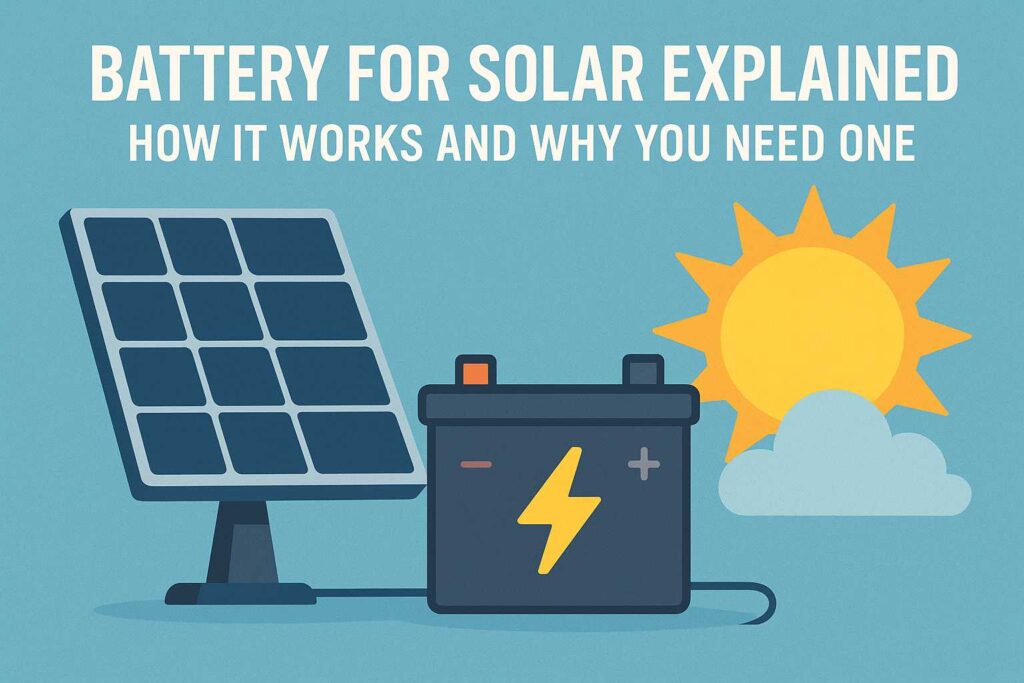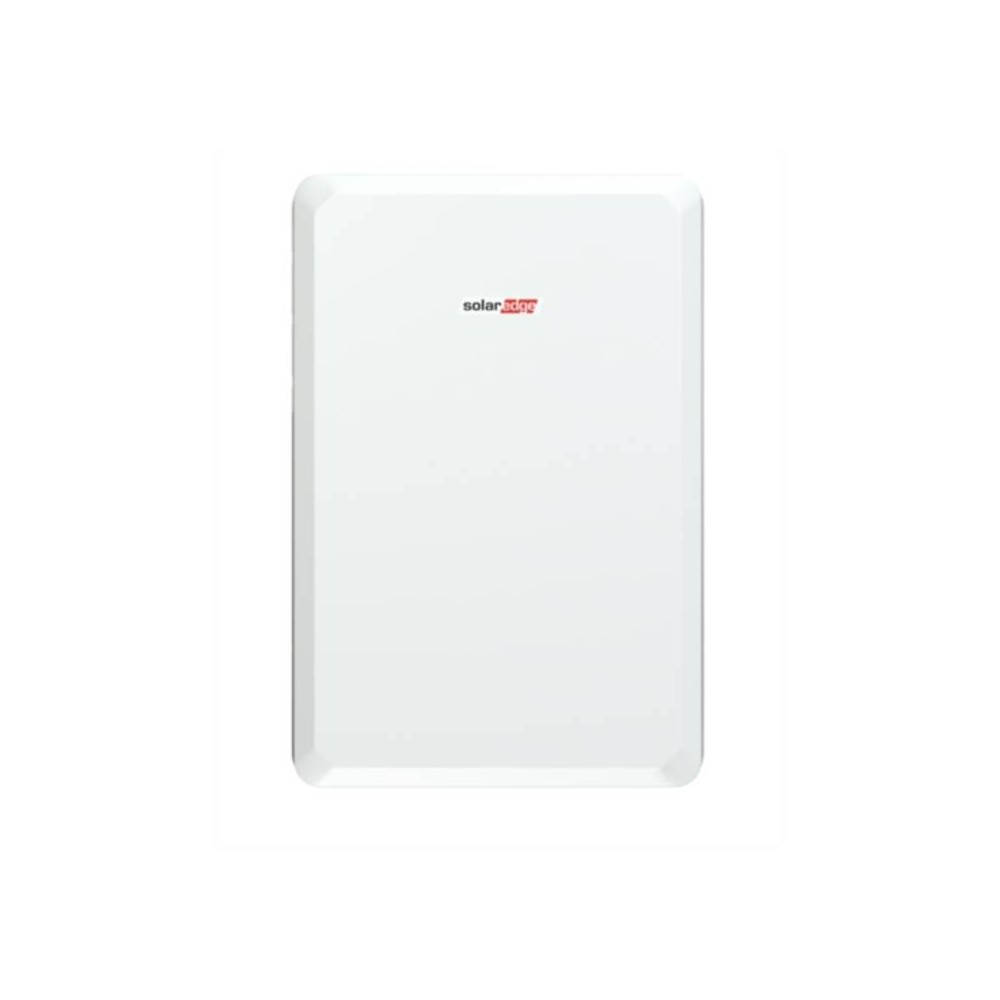📦 Fast Delivery – Order Now!
💸 Shop Safely – 100% Money-Back Guarantee
👨🔧 Lifetime Customer Support
📦 Fast Delivery – Order Now!
💸 Shop Safely – 100% Money-Back Guarantee
👨🔧 Lifetime Customer Support
Solar energy doesn’t stop when the sun sets – and that’s where a battery for solar charging comes in. In this guide, we break down how these batteries work, the different types available, and why adding one to your solar system might be the smartest energy decision you can make in 2025.
A solar charging battery is an energy storage solution designed to capture and hold the excess electricity generated by your panels. Instead of sending unused power back to the grid, the battery stores it for later use — for example, during the evening, at night, or on cloudy days when energy production is low.
These batteries are a core component of modern solar systems, especially for homeowners and businesses aiming to increase self-consumption, gain independence from the public grid, and ensure backup power in the event of outages. Whether you live in a remote location or just want to cut your electricity bill, a solar battery brings added flexibility and resilience to your energy setup.
In short: A solar charging battery helps you use your energy whenever you need it — not just when the sun is shining.

The functionality of a solar charging battery is based on a smart energy flow between your solar panels, a charge controller, the battery itself, and your inverter. Here’s how the process typically works:
This system works seamlessly in the background, automatically adjusting based on your energy needs and solar production.
Key takeaway: Solar batteries give you control over when and how your solar energy is used — increasing efficiency, savings, and security.
✅ Lithium-Ion: Long lifespan, compact design, high round-trip efficiency
✅ Lead-Acid: Budget-friendly, widely available, shorter cycle life
✅ Flow Batteries: Scalable and durable, ideal for larger installations
✅ Saltwater Batteries: Non-toxic and sustainable, still emerging in the market
Each battery type has unique pros and cons. For most residential applications, lithium-ion batteries offer the best balance between cost, performance, and longevity.
Adding a battery to your solar setup is more than just an upgrade – it’s a strategic energy decision. Here are the main benefits:
With rising energy prices and growing interest in sustainability, a battery-backed solar system offers long-term value and peace of mind.
Ask yourself the following questions:
If you answered “yes” to any of these, a battery is likely a smart investment for your property.
Whether you’re starting fresh or adding storage to an existing system, integration is straightforward with the right components:
Smart energy monitoring tools can also help you visualize savings and optimize your usage patterns.
A solar charging battery is more than a piece of hardware – it’s an enabler of true energy autonomy. With the right setup, you can produce, store, and manage your power on your terms. Whether you’re driven by economics, sustainability, or resilience, battery storage puts you in control of your energy future.

Let’s build your energy independence – one battery at a time.

A solar battery stores excess electricity generated by solar panels so it can be used later, such as at night or during a power outage. It ensures energy availability even when your panels aren’t producing power.
Yes, most existing systems can be upgraded with a battery. You’ll need to ensure your inverter is compatible (or consider an AC-coupled battery solution) and have the setup installed by a certified professional.
On average, modern lithium-ion solar batteries last 10 to 15 years, depending on usage, depth of discharge, and environmental conditions. Most come with warranties ranging from 5 to 12 years.
Lithium-ion batteries are currently the most efficient and widely used option for residential solar. They offer high energy density, long lifespan, and fast charging capabilities. Other types include lead-acid, flow, and saltwater batteries.
Depending on capacity, brand, and installation, prices range from $5,000 to $15,000. Incentives and tax credits may reduce the effective cost. In some regions, rebates and grid services may also be available.
Yes, especially if you aim for greater energy independence, live in an area with time-of-use pricing or grid instability, or want backup power during outages. While the upfront cost is significant, the long-term savings and resilience often justify the investment.
It depends on your daily energy consumption and desired backup duration. A typical home may require 5–15 kWh of storage. Our Solar Kit Configurator helps determine the ideal size for your needs.
Yes, but you’ll need a large enough battery bank, sufficient solar capacity, and possibly a backup generator. Full off-grid systems require careful planning and are ideal for remote locations or those seeking total independence.
Only if your system is designed for backup power. Grid-tied systems without batteries usually shut down during outages. A battery paired with the right inverter can supply electricity during blackouts.
Yes. In the U.S., you may qualify for the federal solar tax credit (ITC) and additional state-specific rebates or programs.
For solar charging, lithium-ion batteries are the industry standard due to their high efficiency, long lifespan, and compact size. Other options include lead-acid, flow, and saltwater batteries, but lithium-ion currently offers the best performance-to-cost ratio for residential and commercial systems.
Yes, solar batteries require a charge controller or a dedicated battery management system (BMS) to regulate voltage and current during charging. This prevents overcharging, optimizes battery health, and ensures safe operation within the system.
Costs vary depending on capacity and technology. Typical residential solar batteries range from $5,000 to $15,000 installed. Prices continue to decrease with advances in technology and higher market adoption. Incentives may reduce your net investment significantly.

✅ 10 kWh energy storage
✅ Seamless integration with SolarEdge inverters
✅ Long-term performance
A 10kWh solar battery system generally costs between $5,000 and $10,000. The exact price depends on battery type, brand, warranty, and any additional system components. Larger capacity batteries offer more backup power but require a higher upfront investment.
AceFlex is one of the leading online retailers of renewable energy products and offers a wide range of solar products. We work with well-known manufacturers and wholesalers and can offer you cost-effective products in the field of photovoltaics so that you too can contribute to the energy transition.
Looking for an experienced team for planning your photovoltaic system without the hassle of doing it yourself? We are your trusted partner, offering comprehensive nationwide solutions. We provide expert consultation and supply of both photovoltaic systems and storage units tailored to your specific needs.
© 2025 Aceflex All Rights Reserved. Design by Media Pantheon, Inc.